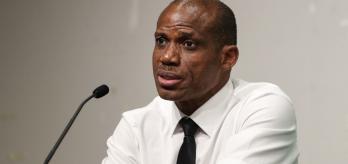Jürgen Klinsmann has a long history with the FIFA World Cup™. In 1990, he won the competition as a player with West Germany. Then, in 2006, he returned to football's biggest stage as a coach, taking Germany to a third-place finish on home soil. Eight years later he competed again, this time as coach of the USA, and guided his squad to the round of 16. In the interview below, Jürgen draws from his extensive knowledge of the competition in a wide-ranging discussion ahead of the upcoming World Cup, ranging from Enhanced Football Intelligence to national footballing identities.
Watch interview
Five talking points
00:11
The impact of winning a World Cup
Winning the World Cup didn't have much impact on Jürgen's playing career. As a player, you are constantly going from goal to goal and moving on quickly to the next project, so there was no real time to reflect on his achievements while he was playing. The real impact of winning the World Cup became clear after his playing career. When you travel around the world, you connect with people who have fond memories of the World Cup, and Jürgen's connections come from the 1990 FIFA World Cup Italy™.
01:39
Coaching Germany and the USA
On one hand, coaching Germany and coaching the USA were similar in that success meant tapping into the identity of the nation as a whole and of individual players. As Jürgen explains, individual players carry with them their own unique backgrounds. Fusing these individuals together into one team is a key role of a national team coach, and this was important with Germany and with the USA. On the other hand, expectations of the two sides were different. As hosts of the World Cup in 2006 and having already won the competition three times, Jürgen's German side were expected to win.
05:23
Football and identity
For Jürgen, international football is influenced by cultural factors in addition to the tactical and technical elements we usually associate with the game. For example, when a culture places emphasis on the family, that group-orientated dynamic is often reflected in the country's football. If a people are passionate, their football can reflect that too. For Jürgen, this cultural element plays a bigger role in football than in any other sport.
08:43
Enhanced Football intelligence
Data such as FIFA's Enhanced Football Intelligence can help back up instinctive observations, says Jürgen. Having these statistics to complement your gut feeling can help develop a clearer analysis. He believes football has to embrace technological changes, despite the teething troubles they have brought with them.
13:06
Key characteristics of top teams
To progress to the latter stages of the competition, teams need to understand the specific moment in time they find themselves in. This World Cup is unique as it is being played mid-season for many countries. Some players will have just one week to prepare themselves for their first group game. The teams that adapt best to this unfamiliar situation and get everything in place for the four weeks of the tournament will be the ones to feature in the latter stages.













